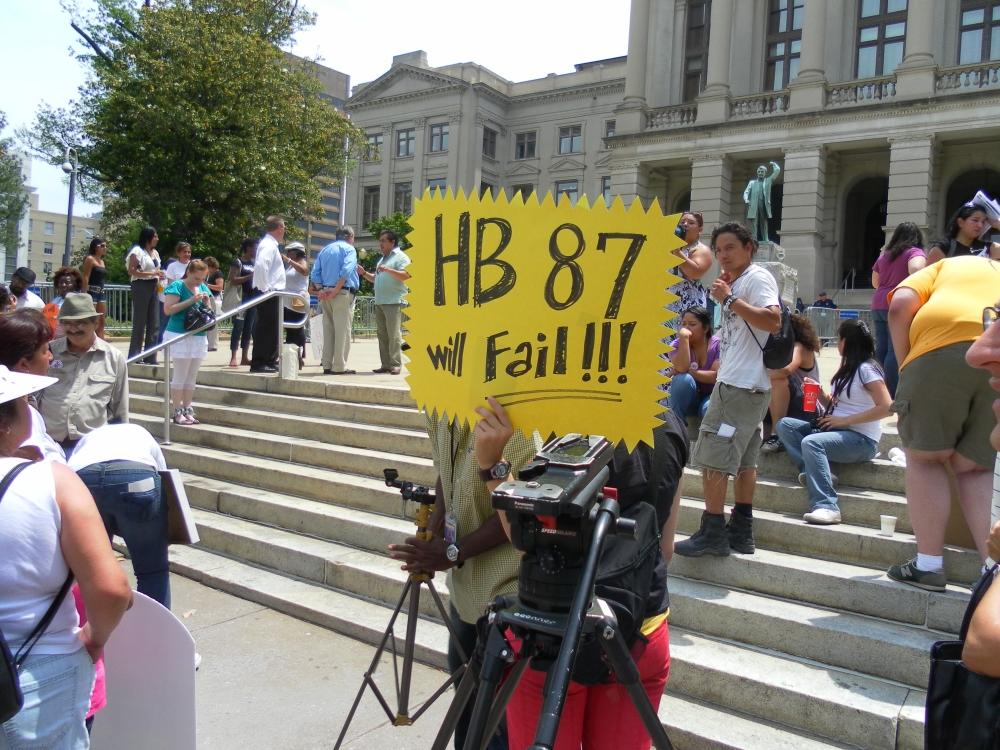
Section Branding
Header Content
Court Immigration Ruling Impacts Georgia
Primary Content

The U.S. Supreme Court ruled Monday that parts of an Arizona immigration law are unconstitutional. The law is a model for a similar Georgia measure partly blocked by a federal court. The High Court ruling now means a federal court in Atlanta can rule on Georgia’s immigration law.
When Georgia’s sweeping immigration crackdown became law last July, parts of it did go into effect. For example, many employers are required to check workers’ immigration status.
But it was also a year ago when a federal judge enforced a temporary injunction on parts of Georgia’s law, ruling that it encroached on federal power.
On Monday, the High Court took a similar approach. It struck down three of four Arizona provisions on the grounds that immigration enforcement belongs to the federal government.
But it did uphold one piece of the Arizona law that is key to Georgia’s legislation. The court ruled police can check the immigration status of some criminal suspects.
Georgia’s law, known as HB 87, contains a similar tenet, known as the ‘show me your papers’ provision. That’s an element that’s been on hold since last July.
Charles Kuck is one of the attorneys suing over Georgia’s immigration law. He says the justices only upheld the provision pending future legal challenges. He says that leaves “show me your papers” vulnerable to future lawsuits.
“This is a resounding defeat to those legislators around the country that believe that states can pass immigration laws,” he said. “The Supreme Court said, ‘Sorry boys you can’t do that’.”
Matt Ramsey is the Peachtree City lawmaker who sponsored Georgia’s immigration law. He says the court’s move to uphold that provision is a victory.
“It validates the hours and hours of work we spent to draft HB 87 to ensure that we had a bill that would pass constitutional and statutory muster,” he said.
Ramsey dismissed the court’s comment about future legal challenges, saying that he expects the law’s opponents will go to great lengths to undermine it.
Those affected by Georgia’s immigration law saw Monday’s decision as a mixed bag.
Paul Bridges is the Republican mayor of the southeast Georgia community of Uvalda, and a plaintiff in Georgia’s case. He says the law has disrupted the lives of Latino citizens and others in his town, near Vidalia. And he says with the court’s ruling for the “show me your papers” provision, they will likely still be subject to searches and stops.
“The HB 87 has been driving fear amongst the Latino population and anyone associating with the Latino population where intermarriages and mixed status can occur, and I saw it as opening the door to racial profiling,” he said.
The Arizona and Georgia immigration statutes are not identical. Arizona’s case didn’t include a provision that would make it a crime to knowingly transport or harbor illegal immigrants. A federal court blocked that portion of Georgia’s law as well.
Anton Flores is one of the plaintiffs directly affected by that provision. He’s with Alterna, which operates a hospitality house in LaGrange for family members of undocumented residents detained at Stewart Detention Center in west Georgia.
He says that section of the law interferes with his group’s mission, and with his Christian faith.
“Some of the elements of HB 87, when we filed the complaint would have criminalized what have been long-standing traditions within the Christian faith, which as Alterna, we are deeply rooted in our Christian faith. So things like welcoming the stranger,” he said.
Judges with the 11th Circuit Court of Appeals in Atlanta are next expected to solicit motions from both sides of the Georgia case, and will likely rule later this year.
Tags: immigration, illegal immigrants, Arizona's immigration law
Bottom Content

